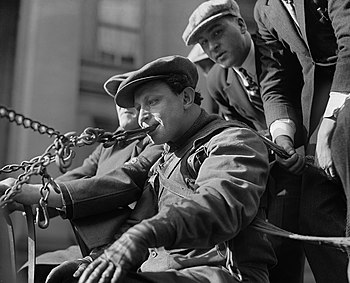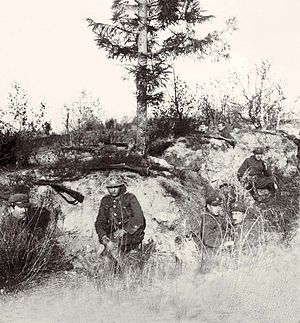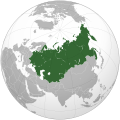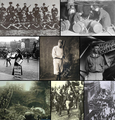Portal:1920s
The 1920s Portal
Silent films were popular in this decade, with the highest-grossing film of this decade being either the American silent epic adventure-drama film Ben-Hur: A Tale of the Christ or the American silent war drama film The Big Parade, depending on the metrics used. Sinclair Lewis was a popular author in the United States in the 1920s, with his books Main Street and Elmer Gantry becoming best-sellers. Best-selling books outside the US included the Czech book The Good Soldier Švejk, which sold 20 million copies. Songs of this decade included "Mack the Knife" and "Tiptoe Through the Tulips". During the 1920s, the world population increased from 1.87 to 2.05 billion, with approximately 700 million births and 525 million deaths in total. (Full article...) Selected article -The Battle of Radzymin (Polish: Bitwa pod Radzyminem) took place during the Polish–Soviet War (1919–21). The battle occurred near the town of Radzymin, some 20 kilometres (12 mi) north-east of Warsaw, between August 13 and 16, 1920. Along with the Battle of Ossów and the Polish counteroffensive from the Wieprz River area, this engagement was a key part of what later became known as the Battle of Warsaw. It also proved to be one of the bloodiest and most intense battles of the Polish–Soviet War. The first phase of the battle began on August 13 with a frontal assault by the Red Army on the Praga bridgehead. The Russian forces captured Radzymin on August 14 and breached the lines of the 1st Polish Army, which was defending Warsaw from the east. Radzymin changed hands several times in heavy combat. Foreign diplomats, with the exception of the British and Vatican ambassadors, hastily left Warsaw. (Full article...)Featured picture Siegmund "Zishe" Breitbart (1893–1925), shown here pulling a heavy weight using only his teeth, was a Polish strongman and circus performer who was known as the "Strongest Man in the World" during the 1920s. He was widely popular in both Europe and the U.S., but died at the age of 32 after an accident during a performance. Did you know...
Related portalsSelected biography -Józef Klemens Piłsudski[a] (Polish: [ˈjuzɛf ˈklɛmɛns piwˈsutskʲi] ; 5 December 1867 – 12 May 1935) was a Polish statesman who served as the Chief of State (1918–1922) and first Marshal of Poland (from 1920). In the aftermath of World War I, he became an increasingly dominant figure in Polish politics and exerted significant influence on shaping the country's foreign policy. Piłsudski is viewed as a father of the Second Polish Republic, which was re-established in 1918, 123 years after the final partition of Poland in 1795, and was considered de facto leader (1926–1935) of the Second Republic as the Minister of Military Affairs. Seeing himself as a descendant of the culture and traditions of the Polish–Lithuanian Commonwealth, Piłsudski believed in a multi-ethnic Poland—"a home of nations" including indigenous ethnic and religious minorities. Early in his political career, Piłsudski became a leader of the Polish Socialist Party. Believing Poland's independence would be won militarily, he formed the Polish Legions. In 1914, he predicted a new major war would defeat the Russian Empire and the Central Powers. After World War I began in 1914, Piłsudski's Legions fought alongside Austria-Hungary against Russia. In 1917, with Russia faring poorly in the war, he withdrew his support for the Central Powers, and was imprisoned in Magdeburg by the Germans. (Full article...)TopicsWikiProjects
List articlesMore Did you know (auto generated)
CategoriesGeneral imagesThe following are images from various 1920s-related articles on Wikipedia.
Recognized content
Associated WikimediaThe following Wikimedia Foundation sister projects provide more on this subject:
Discover Wikipedia using portals |




















































